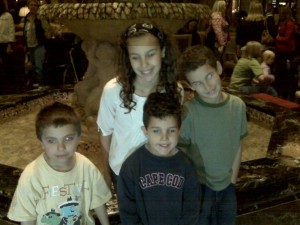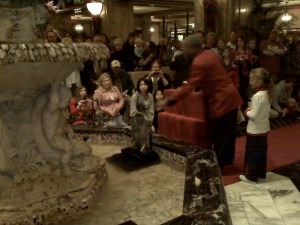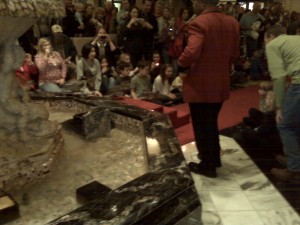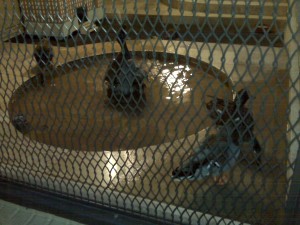Many years ago (well in excess of a decade), there was a magazine article about tuna fishing and the process of selecting the premium fish caught here in the North Atlantic that would fly to Japan. It is possibly “Those Wild Tuna Guys” by Anthony Tillett in Harper’s Magazine, published in 1987. However, I am too cheap to pay the subscription to look it up and see.
At any rate, the article describes the rigors of tuna fishing and the emotional exercise of having one’s bounty examined to see if its quality warrants shipment to Japan, where the meat demands the highest price for premium sushi. This is the ultimate goal of the hopeful tuna hunter, and the five-digit match of the fishing lottery. In the article, the tuna broker breaks the news, “This tuna’s not going to Japan.”
Well, it looks like our little tuna may not be going to Japan or, in this case, Jacksonville. The analogy does not carry through very well to describe Colin’s situation, but there is always disappointment associated with shaving off another advancement that could have benefited him in the long run.
The fact is that our doctors are concerned that it will be too difficult to coordinate Colin’s care in Jacksonville, where the proton facility is separate from the clinic and hospital. This, of course, on top of the fact that it takes months for a medical team to get to know Colin, and he requires the attention of a variety of sub-specialists, including ENT, GI, cardiology and Infectious Disease.
We have already learned that Colin tends to uproot uncommon side effects and land himself in highly unlikely positions. Given the fact that he is medically fragile (most children on this protocol are in the hospital for a few days at a time, simply to receive chemo and then for neutropenic fevers) and has been hospitalized for the bulk of his stay in Memphis so far, they think it is unlikely that Colin will be in the kind of shape where they will feel confident shipping him to Florida.
Dr. Gajjar and Dr. DeWire appeared upstairs on Friday afternoon looking for a room to discuss Colin’s case, and I was the only one there (Dad had already left to pick up Aidan). It was a “serious talk” moment; at work, one would either expect to get fired or get a raise.
This situation reveals the interesting dynamic of physician and patient, where the physician may arrive at a conclusion that the patient (in this case, the patient’s family) may be expected to provide resistance to. How, then, to best make the case to elicit the desired response?
The fact is that the physician is not in a position to say, “This is what’s going to happen” because that is not how medicine works. Informed consent is required at every step of the way and assent to a prior procedure does not imply assent to a subsequent one. Thus, in both practical and legal terms, the patient/family must be part of the decisionmaking. At the very least, they must be coaxed into agreeing with the proposed medical plan.
For my part, I was surprised that they were so concerned that we would offer resistance. We have been openly anxious about the process of transferring Colin’s care until he is more stabilized. The benefits of proton therapy are at this point only suspected, if highly so. Furthermore, the efficacy of the therapy against the cancer is the same; the only difference is in long-term effects.
The photon-based radiation option that they offer here, intensity modulated radiation therapy (IMRT), has been done here for many years, and St. Jude has good longitudinal data on results with small children. Even at our first meeting, Dr. Merchant mentioned, a propos of nothing, that he would have no problem recommending that a child stay here at St. Jude for IMRT rather than go for protons.
Thus, what price would we have to pay to get what is currently thought to be the safest radiation option for Colin? We would have to transport his entire support system and establish relationships with new doctors; we would deal with a variety of unknowns regarding the protocols and standards for care as well as communication among the various disciplines.
Of course, the system in Jacksonville is suitable for most of the children on this protocol, so there is clearly some point at which the absence of the holistic safety net of St. Jude is not risky enough to outweigh the benefit of pursuing proton therapy. Most of the kids on this protocol that we have met are ambulatory with few, if any, apparent deficits from surgery or further complications. It is clear why the scale tips the balance in favor of Jacksonville for them, yet not as clear where the middle of that fulcrum point lies.
Though walking is not requisite, nor was it cited by either doctor as the specific deciding milestone, it is certainly one that Colin has not met. Although I had been hopeful that he would start walking again with a walker by the end of therapy here, I had not forseen how disabling the cumulative effects of chemotherapy would be come.
Between the nausea and vomiting that come immediately after chemo and the fatigue of neutropenia, there is relatively little opportunity for Colin to take large strides (pun intended) in therapy.
The plans to go to Jacksonville are not completely off the table, but we are actively reassessing whether it is in Colin’s best interests to go. At this point, the general sense is that he will not be up to it, although a tremendous change in his medical status might change our minds. Overshadowing all of this is something that is not likely to disappear within a few months, the lurking endocarditis.
There is an irony to the fact that, in one place where we had our plan laid out for us before we even arrived, we must carefully consider whether that presumed predestination makes sense for Colin. There is also a comfort in knowing that the doctors themselves questioned it and it was not the result of an independent and long belabored decision on our part.
Colin’s square peg need not get compressed into the round hole of Jacksonville; only if its corners soften adequately will the original plan go ahead. The likelihood of this is close enough to nil and may be overridden by our concerns over the endocarditis, but with Colin we have learned to never let go of extreme possibilities.
However, the time frame for this is narrowing fast. Colin’s new port goes in on December 1, and the last round of chemo starts shortly thereafter. His end-of-chemo MRI is scheduled between Christmas and New Year, and we will be getting our final opinion on whether Colin will need another surgery before starting radiation. It is hard to imagine that the rigors of neurosurgery would make Colin’s condition any more conducive to treatment in Florida.
Weekend Visitors

On a more immediate note, we had a wonderful visit from old friends back home who have moved to Nashville, the Hayduks. With Colin’s ANC still at 0, he was in no condition to go out but was delighted to see visitors. We have never seen so much activity in Colin’s room!
To top it all off, Dr. DeWire stopped by and talked to Dad for the first time since she and Dr. Gajjar forwarded the idea of keeping our little tuna here in Memphis for radiation.
Dad stayed with Colin while everybody else went on to Target House and we gave a tour of our new digs, then went on to lunch at Huey’s, a quick stop back at Target House, and a visit to The Peabody for the famous running of the ducks or whatever it is called.

The Peabody is a, or probably the, swanky and gentile hotel in Memphis. It is beautifully and intimately appointed with marble, gilding, and wood paneled elevators. Twice a day, an elevator is requisitioned for the exclusive use of the Peabody ducks.
The tradition of the ducks dates back to a time when an origin story appealing to children could quaintly involve the over consumption of whiskey. Today, it has a bit of a “cover their ears” quality to it, but they keep the children out of arm’s reach by giving them privileged spots along the ducks’ red carpet, leaving it up to those delicate ears to interpret the strangeness of the story under their own steam.

The ducks spend their days in the small but well kept confines of a marble fountain lined with tile mosaic and topped with an insanely luxe flower arrangement (think: an entire wedding in one vase). It is a small but regal hangout that provides enough room for the ducks to gambol in yet presumably enough daytime traffic to keep them from straying far.
The ducks are strangely responsive to their handlers, who scold the ducks for their impatience to get home. In fact, they are required to exit the fountain delicately on a carpeted red set of stairs that is brought in for the purpose, although they are fully capable of jumping down on their own (and abraded for doing so).
Ultimately, the ducks wait until the time is right for them to march behind the mama of a theatrical gentleman with a cane. However, the process takes at least half-an-hour as onlookers gather around the fountain for a good view. The ringmaster passes the time and attenuates the anticipation by relating the well practiced story of the hotel and the ducks in dramatic tones but is only able to deliver the history because he has an entirely captive audience.
There is a daily Keeper of the Ducks, a privilege that one can pay for or, presumably, also be bestowed through some act or good fortune. One is obliged to proclaim the honoree’s cuteness of the child (not that it’s ever untrue) and clap compliantly to congratulate the child, whether a Pollyanna or Veruca Salt, for the privilege of the duckly duties (there are no actual duties).
The duck emcee proudly proclaims that the ducks are retired after only three months of work without vacations or breaks, haha, yet fails to describe what a duck retirement looks like. My thoughts jump immediately to confit and the aptness of these pampered, grain-fattened fowl for culinary purposes.
It would be very Southern of them to concoct such an ironic ending to a story that begins with a drunken duck hunting trip, but it would be too much for the children to bear. And PETA would be all over it, but frankly the duck slavery alone is enough to raise their hackles.

Perhaps the deal is more equitable than all that, as the hotel provides the ducks with very comfortable quarters that they occupy between 5 p.m. and 11 a.m. Guests are allowed to visit Duckingham Palace, located behind a regal facade on the roof. There is a fountain with a duck statue in the middle and a duck house designed after the hotel itself.
The roof also boasts a wonderful view of Memphis, which was particularly enjoyable on this warm-but-cooling evening. It is a good place to remember that people come to Memphis for non-medical reasons. The kids raced each other through the open spaces and clung high enough on the railing around the perimeter to inspire parental agita.
We arrived on the roof in time for a rosy sunset and a bright crescent moon nestled in haze. Reality disrupted the potential magic like a web of cracks in a thin layer of glossy dark ice, an imperfection that steals none of the fundamental beauty. As with other ventures into Memphis tourism, this was a welcome reminder that a non-oncology world exists.
When later quizzed, Colin expressed great interest in seeing the famous Peabody ducks, though the question wasn’t framed so precisely. He would be delighted to see any ducks, but will likely take particular pleasure in the incongruity of the Peabody ducks.
First, Colin needs to have his counts recover. In the last cycle, his ANC was a big goose egg for three days before it began creeping up again; Saturday was the third day at rock bottom, so his pendulum is likely to swing in the other direction shortly.
The coming days and weeks will tell us more about our plans for radiation, though the wind is clearly blowing in the direction of Memphis. Maybe this tuna isn’t going to Japan, but he’s going to go somewhere.
I suppose the doctor’s experiences have trained them to expect resistance. Colin’s progress is, of course, your first concern. There are probably many parents that can’t understand, or aren’t up to making the effort to grasp the complexity of it all and are looking for another solution. The constant concern and stress of Colin’s illness is trying I expect. I wish there were some way all of us could take on some of Colin’s discomfort and frustration as well as yours. If only there were a way to make it easier on all of you. Please reach out it there’s something that we CAN do.
I’m happy to hear of the visit from the Hayduks. How wonderful that they made the trip.
Keep pushing through!
-Pam, Jon and Leo
I’m still here if you need me. Bless you guys.